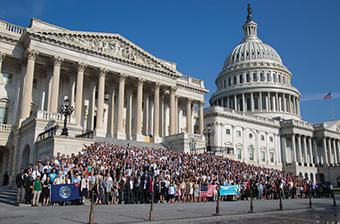
Climate Lobby Puts Citizens on Capitol Hill

What Is Carbon Fee & Dividend?
Carbon Fee & Dividend (CD&F) would recover some of the costs imposed on society by burning fossil fuels. The fee is based on the amount of greenhouse gas pollution generated by burning oil, gas or coal, and would be collected at the earliest point of entry into the economy — well, mine or port. All fees, minus administrative costs, would be returned to U.S. households as an energy dividend in equal payments to each adult. Returning the fee, which would make it revenue-neutral, is an important consideration for many conservative members of Congress.
A study conducted by Regional Economics Modeling Inc. estimated that in the first 20 years, Carbon Fee & Dividend would reduce carbon emissions to 50 percent of 1990 levels, create 2.8 million clean energy jobs, prevent 230,000 premature deaths from fossil-fuel-related air pollution and increase GDP by $1.375 trillion compared to anticipated GDP without the policy.
For more information, go to citizensclimatelobby.org and click on “Our Climate Solution.”
This past June, five Weavers Way members joined with 1,300 citizen lobbyists from 49 states and Canada for the eighth annual Citizens Climate Lobby conference in Washington, D.C. Nearly 500 meetings were held with members of Congress and their staffs.
By joining CCL’s lobbying efforts, these ordinary, unpaid citizens were working to create the political will to adopt strong climate-protecting solutions. In particular, CCL is trying to get Congress to pass a Carbon Fee & Dividend, the single most powerful way of transitioning the global economy from fossil fuels to clean, climate-friendlier energy sources. (See the sidebar for more information.)
Founded in 2007, CCL has grown into an international organization with 86,000 supporters in the United States and 365 active chapters, covering almost every congressional district. Building good relationships with members of Congress is essential to what this nonpartisan, nonprofit grassroots organization does. Its volunteer lobbyists are trained to listen intently and engage in respectful conversations, looking for common ground and values. The ultimate goal is to help elected officials understand the urgent need for action to protect against climate change.
Pennsylvania has 12 active chapters, including ones in Philadelphia, Chester, Delaware and Bucks/Montgomery counties. The Philadelphia chapter includes small-business owners, scientists, artists, writers, lawyers, doctors, academics and students. One student (a Weavers Way member) spent a gap year, after finishing high school, volunteering full time with CCL. His efforts resulted in a resolution, adopted unanimously by Philadelphia City Council, calling on Congress to address climate change and consider the CF&D policy.
In addition to lobbying, chapter members write op-ed pieces and letters to the editor and speak to groups about CF&D. The Philadelphia chapter is building relationships with City Council and local representatives in Congress. Its members also are involved with other green organizations and initiatives, such as support for Philadelphia’s rooftop solar campaign.
Concern about climate change is actually spreading rapidly in Congress. Last year, the House of Representatives established a bipartisan Climate Solutions Caucus, which informs members about policy options to reduce climate risks. This year, it grew from 16 members in January to 60 as of Oct. 4. The caucus requires new members to join in pairs, one from each party, so that means 30 of the caucus members are Republicans!
CCL stays in close touch with their offices. During a lobby visit last year, one staffer in a Republican congressional office told a CCL delegation, “You’re on the right side of history. Going forward, the only question is how fast our country and the planet get to where we need to be, and whether we get there in time to ward off complete climate catastrophe.”
In the July issue of The Shuttle, Jon Roesser wrote that in the coming years, the Co-op will focus on five key areas: energy efficiency, food waste, packaging, renewable energy and policy. Under “policy” he pledged: “Take a more active role in influencing policy-makers on environmental issues.”
One way of achieving this goal would be for more Co-op members to join CCL. Start by registering at citizensclimatelobby.org for an introductory conference call, scheduled each Wednesday at 7 p.m.
The Philadelphia chapter holds regular meetings on the second Saturday of each month to discuss its ongoing work and to participate in a national video conference. Meetings are currently held over a potluck lunch at CityCoho, a co-working space at 24th and Walnut streets in Center City. For more information, go to citizensclimatelobby.org and click on “Find a Local Chapter,” or contact Peter Handler (also a Co-op member) at handlerstudio@gmail.com.
Bill Hengst and Karen Melton are Weavers Way members.
